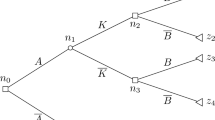Abstract
An agent who violates independence can avoid dynamic inconsistency in sequential choice if he is sophisticated enough to make use of backward induction in planning. However, Seidenfeld has demonstrated that such a sophisticated agent with “dependent” preferences is bound to violate the principle of dynamic substitution, according to which admissibility of a plan is preserved under substitution of indifferent options at various choice nodes in the decision tree. Since Seidenfeld considers dynamic substitution to be a coherence condition on dynamic choice, he concludes that sophistication cannot save a violator of independence from incoherence. In response to McClennen’s objection that relying on dynamic substitution when independence is at stake must be question-begging, Seidenfeld undertakes to prove that dynamic substitution follows from the principle of backward induction alone, provided we assume that the agent’s admissible choices from different sets of feasible plans are all based on a fixed underlying preference ordering of plans. This paper shows that Seidenfeld’s proof fails: depending on the interpretation, it is either invalid or based on an unacceptable assumption.
Similar content being viewed by others
REFERENCES
Asheim, G.B.: 1991, ‘Individual and Collective Time-Consistency’, Department of Economics, University of Oslo, circulated manuscript.
McClennen, E.: 1988, ‘Ordering and Independence. A Comment on Professor Seidenfeld’, Economics and Philosophy 4, 298-308.
McClennen, E.: 1990, Rationality and Dynamic Choice, Cambridge: University Press.
Rabinowicz, W.: 1995, ‘To Have One’s Cake And Eat It: How to Make Sequential Choices When One’s Preferences Violate Expected Utility Axioms’, Journal of Philosophy 112, 586-620.
Seidenfeld, T.: 1988a, ‘Decision Theory Without “Independence” Or Without “Ordering”’, Economics and Philosophy 4, 267-290.
Seidenfeld, T.: 1988b, ‘Rejoinder [to Hammond and McClennen]’, Economics and Philosophy 4, 309-315.
Author information
Authors and Affiliations
Rights and permissions
About this article
Cite this article
Rabinowicz, W. On Seidenfeld‘s Criticism of Sophisticated Violations of the Independence Axiom 1 . Theory and Decision 43, 279–292 (1997). https://doi.org/10.1023/A:1004920611437
Issue Date:
DOI: https://doi.org/10.1023/A:1004920611437




